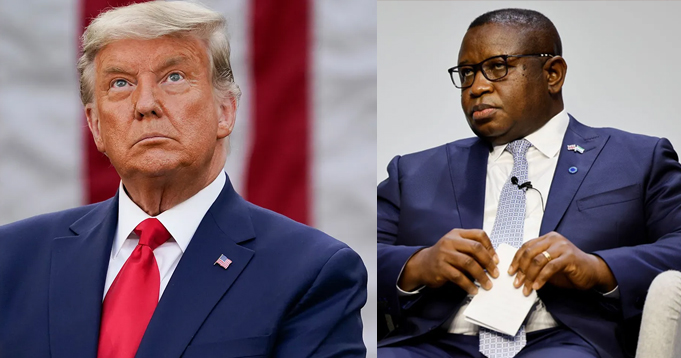The potential return of Donald Trump to the U.S. presidency holds significant implications for Africa, including Sierra Leone. His unpredictable policies and the “America First” approach he championed during his first term signal potential challenges for the continent.
The 2024 U.S. election is more than just a contest between two candidates; it’s a battle of contrasting global ideologies. Given America’s global influence, the outcome of this election will inevitably affect Africa, regardless of how closely many on the continent are following the campaign.
For some African nations, particularly in Sierra Leone, Trump remains favored due to his alignment with conservative values. Sierra Leoneans, who tend to be deeply religious, often see the Republican Party as a defender of traditional Christian values and conservative norms. On the other hand, the Democratic Party’s progressive social policies, which many see as at odds with these values, have created a clear divide. However, this admiration for Trump often overlooks his lack of policies that favor Africa, a point that became evident during his first term.
The Likely Impact of a Trump Presidency on Sierra Leone and Africa
Based on his record during his first term, a second Trump presidency would likely present numerous challenges for Africa. Trump’s “America First” philosophy emphasized prioritizing U.S. interests over international cooperation, and his policies often had adverse effects on the continent.
A key example of this is the travel ban that Trump implemented, initially targeting Muslim-majority countries, but later expanding to include several African nations. In 2020, this policy further restricted immigration from countries like Sierra Leone, significantly limiting the opportunities for Sierra Leoneans to migrate to the U.S. Trump’s administration also halted the issuance of visas to Sierra Leoneans in September 2020 after a dispute regarding the repatriation of deported nationals.
Trump’s presidency also witnessed proposed cuts to U.S. foreign aid, including reductions to programs that have traditionally supported Africa, such as those under USAID. These programs have been instrumental in advancing healthcare, education, and women’s empowerment across the continent. Additionally, Trump’s administration reduced diplomatic engagement with African nations, withdrawing from international organizations like the World Health Organization (WHO) and scaling back U.S. involvement in peacekeeping missions in Africa.
These policies created significant setbacks for African nations that rely on U.S. support for development and stability. Trump’s actions also negatively affected African immigrants in the U.S., including efforts to end Temporary Protected Status (TPS) for certain African nationals, leaving many vulnerable.
Perhaps the most stark example of Trump’s approach to Africa was his controversial 2018 comment, allegedly referring to African nations as “shithole countries.” This derogatory remark was widely condemned for its racial insensitivity and demonstrated a dismissive view toward African nations and their contributions on the global stage.
Should Trump return to office, African nations like Sierra Leone could face even more challenging circumstances. His policies could further restrict immigration from Africa, cut vital aid, and strain diplomatic relations between the U.S. and African countries.
While some African Americans in the U.S. have shown strong support for Trump, admiring his tough leadership style, this has not translated into an equally positive outlook for Africa. In fact, African nations may have to brace for more restrictive, isolationist policies that could undermine the continent’s political, social, and economic progress.
In conclusion, a Trump presidency could lead to greater challenges for African nations, including Sierra Leone. From reduced aid and limited diplomatic engagement to more stringent immigration policies, Trump’s return to power may complicate Africa’s pursuit of development and global cooperation.

